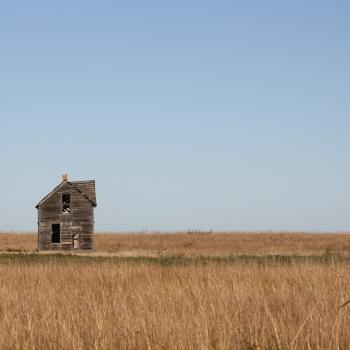
Earlier this year, I sought out rural pastors and leaders who had experienced burnout. It wasn’t hard to find them. There were plenty of folks who had gone to hoist the bucket one more time and discovered that the well was dry. The question lie more around defining burnout. Did it mean you quit ministry? That you were fatigued? That you sometimes fantasize about becoming a plumber?
The pastors I talked to or heard about mostly hadn’t dropped out of ministry, though some had moved into a parallel profession, like nursing home chaplaincy. Nor could their burnout be chalked up to the usual explanations. (Hint: It starts with “pan” and ends with “demic”). Their experience was more like the German loan word Weltschmerz—a sense of apathy and tiredness arising from the disjunction between the ideal and the actual in their ministry.
My project interviewing burnt out rural pastors was a personal journey for me. You see in 2021, I was burned out. Counseling or a sabbatical would have probably been a good idea. Psychopharmaceuticals might have helped. Instead, I wrote my way through the blah. (Watch for my forthcoming article on rural pastor burnout in Christian Century!).
Here’s something I discovered: burnout in ministry is that it’s rarely due to overwork. Yes, sometimes pastors are busy. But we’re idealists. We got into the biz because we want to make an impact for the Kingdom, and we’re willing to push ourselves to do it. Sure, there are evenings when we just want to have a beer and watch a movie. No shame in that. But I suspect that more often than not we pastors long to be poured out for something greater than ourselves. Working hard isn’t the problem.
In 2 Corinthians—which we maybe should read as Paul’s anti-burnout letter—the apostle catalogs his sufferings and exertions and efforts for the church. He’s crushed and perplexed “but not driven to despair” (4:8). It’s all a “slight momentary affliction” (4:17). If you compare him to other so-called apostles, says Paul: “I’ve worked much harder, been jailed more often, beaten up more times than I can count, and at death’s door time after time” (11:23 MSG). And yet, he pushes through. We pastors know what Paul’s talking about when he says: “I will most gladly spend and be spent for you” (12:15).
If pastoral burnout isn’t primarily about overwork, then it can’t be addressed by taking a break or achieving better “balance” in our lives. Self-care won’t get us where we need to go, and in fact self-care risks becoming an exercise in cotton candy distraction. Ministry is whole-self, whole-time work. Sorry not sorry, God wants it all. Like Paul said: “I do not want what is yours, but you” (2 Corinthians 12:14). To give all we have is to die. But holding something back is a different—and more pulpous and sinister—sort of death.
Here’s a way forward on pastoral burnout: Ground yourself in the reality of a God who is bigger than your ministry. Pray, fast, dwell with Scripture, sit in silence. We do the work in ministry. But for the work not to grind us down and kill us, we have to make it sacred. Which means receiving ministry as a gift and being attentive to Jesus’ leading and presence in it. “Apart from me you can do nothing,” Jesus said (John 15:5). We begin to distinguish between the work we do for the church and our singular, precious journey with and toward Christ.
For me, this has meant developing a space for more frequent communion with Christ through a living room eucharistic liturgy that we share with friends. For the last several years, some 15 of us have been meeting regularly to sing and pray and come to the Lord’s table on a Saturday night. Then we feast and talk about life while the kids battle it out with Nerf blasters in the basement.
It’s also meant learning to live with uncertainty around what my ministry is accomplishing. The usual metrics only get at the obvious things. They’re numbers written with markers on dominoes. They topple when we breathe on them too closely. We’ll never know all that God has done through the gifts he’s given us. In ministry, we’ll rarely feel that we have achieved enough.
Through all of this, I’ve found myself drawn to Thomas Merton’s prayer:
I believe that the desire to please you
does in fact please you.
And I hope I have that desire in all that I am doing.
I hope that I will never do anything apart from that desire.
There’s a kind of re-centered rest in that prayer that God intends to be ours. In 2 Corinthians, Paul catalogs all the ways that he gets knocked down. But he gets up again. After all: “The love of Christ urges us on” (2 Corinthians 5:14).












